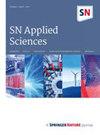Curing treatments of silica gel for fire-retardant glass by intumescence
IF 2.4
Q2 MULTIDISCIPLINARY SCIENCES
引用次数: 0
Abstract
Abstract Silica hydrogels are used as fire-retardant materials due to the occurrence of intumescence that limits heat and mass transfer. They act as heat-sink, through continuous endothermic condensation reactions, meantime shrinking to a more connected network, towards the correspondent crystalline compound. Which compositions and treatments amplify this phenomenon is still of interest. To this aim, two silica sols containing two different complexing agents: ethylene glycol and glycerol has been prepared and analyzed. The samples were subjected to different treatments to induce gelation and densification: exposure to ultraviolet or microwave or infrared irradiation. Thermogravimetric analysis coupled with differential scanning calorimetry (TG-DSC) and scanning electron microscopy analyses has been also carried out. Moreover, dynamic mechanical spectroscopy (DMS) let to evaluate simultaneously the mechanical and intumescence behavior of the gels at increasing curing times for each type of irradiation. Intumescence of gels occurs up to 200 °C and appears as an endothermal group of peaks visible on the heat-flux DSC curves. DMS analyses let to assess that a MW cured glycerol-containing gel (GL-0-MW 6d) shows a glass transition above 150 °C, measured as the maximum of damping peak. Accordingly, this sample is a good option for the application: a few bubbles nucleate and grow fast at high temperature. Article Highlights Transparent fire doors contain silica gel, which absorbs heat and releases water by foaming. Two different silica gels were synthetized using different chelating agents. The foaming depends on the reagents used to produce the gel, on the treatments for stabilizing it and also on ageing. Both foaming and consolidation of the gel were studied with thermogravimetric and dynamic-mechanical analysis.阻燃玻璃用硅胶的膨胀固化处理
摘要二氧化硅水凝胶由于发生膨胀限制了传热传质而被用作阻燃材料。它们通过连续的吸热缩合反应充当吸热器,同时收缩成一个更紧密的网络,朝向相应的晶体化合物。究竟是哪种成分和治疗方法放大了这种现象,仍然值得关注。为此,制备并分析了含有两种不同络合剂乙二醇和甘油的硅溶胶。样品受到不同的处理,以诱导凝胶和致密化:暴露于紫外线或微波或红外照射。热重分析结合差示扫描量热法(TG-DSC)和扫描电镜分析也进行了。此外,动态力学光谱(DMS)可以同时评估凝胶在不同类型辐照下增加固化时间时的力学和膨胀行为。凝胶在200°C时发生膨胀,在热通量DSC曲线上表现为一组吸热峰。DMS分析可以评估MW固化含甘油凝胶(GL-0-MW 6d)在150°C以上显示玻璃化转变,测量为最大阻尼峰。因此,这个样品是应用程序的一个很好的选择:一些气泡在高温下成核并快速生长。透明防火门含有硅胶,吸收热量并通过发泡释放水分。采用不同的螯合剂合成了两种不同的硅胶。泡沫取决于用于生产凝胶的试剂、稳定凝胶的处理方法以及老化。用热重分析和动力力学分析对凝胶的发泡和固结进行了研究。
本文章由计算机程序翻译,如有差异,请以英文原文为准。
求助全文
约1分钟内获得全文
求助全文

 求助内容:
求助内容: 应助结果提醒方式:
应助结果提醒方式:


